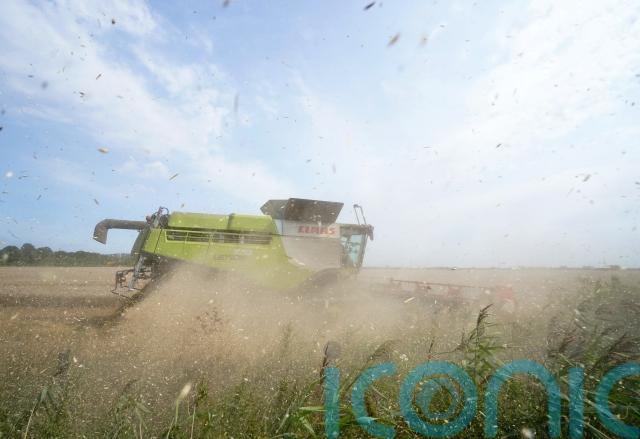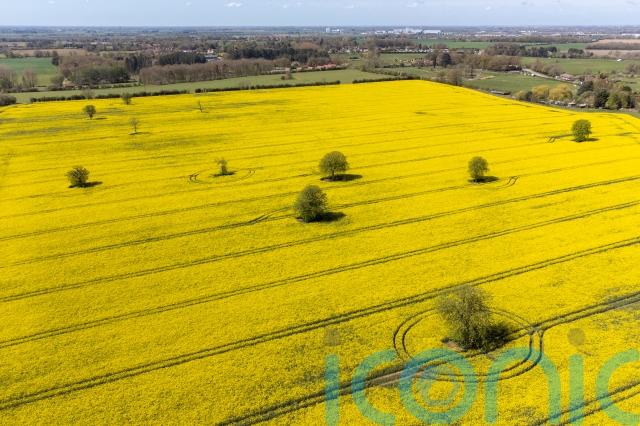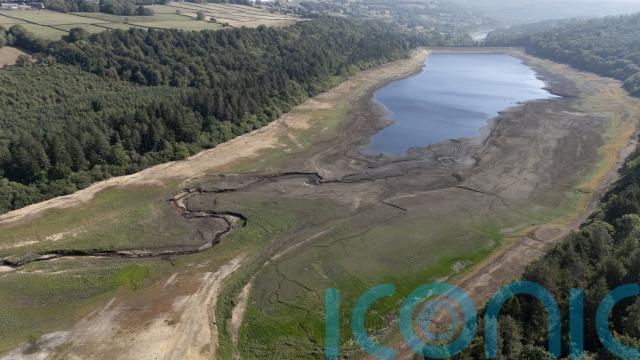
England has seen its second worst harvest on record, according to an analysis of Government figures.
Farmers have been reaping crops after the country’s hottest spring and summer on record as well as the driest spring in more than 100 years, with five regions remaining in official drought.
Provisional data from the Environment Department (Defra) released on Thursday suggests a much worse harvest than experts had so far predicted.
The Agriculture and Horticulture Development Board (AHDB) estimated yields of 7.6 tonnes per hectare for wheat, 6.7 tonnes for winter barley, 5.8 tonnes for spring barley, 5.2 tonnes for oats and 3.7 tonnes for oilseed rape.
However, Defra’s figures show yields to be lower than these estimates across all these crops – with 7.0 tonnes for wheat, 6.5 tonnes for winter barley, 5.0 tonnes for spring barley, 4.6 tonnes for oats and 3.5 tonnes for oilseed rape.

This puts 2025 as the second worst harvest on record, according to an analysis of the Defra figures by the Energy and Climate Intelligence Unit (ECIU).
It comes as the second poor harvest in a row after 2024, which saw heavy rain the preceding winter hitting production of key crops including wheat and oats.
Three of the worst harvests on record have now been seen this decade, with 2020 seeing the worst year and 2024 now bumped into third worst place, the ECIU said.
Tom Lancaster, land, food and farming analyst at the ECIU, said: “This harvest is even worse than expected and marks a second successive poor harvest, following on from one of the worst harvests on record last year after incredibly heavy rainfall, made worse by climate change.
“We have now seen three of the five worst harvests on record this decade after extreme weather, telling a story of escalating climate impacts that farmers are unable to cope with.
“This is what farming with climate change looks like, as extreme weather wrecks harvests, hits farm incomes and reduces our food security.”
Mr Lancaster said supporting farmers to adapt to extreme conditions should now be an “urgent priority for government”.
But he added that the “only real guarantee against these impacts getting even worse is to reach net zero and bring our climate back into balance”.
“By doing this, we will also reduce the costs of key foods that the UK depends upon.”

Elsewhere, the Defra figures suggest overall yields fell below the five-year average, although this varied between regions.
In terms of the overall amount harvested, wheat yields were up 4.9% from 2024 but this was mainly due to an increase in the area of land used to grow the crop.
Barley estimates were down 14% on last year and oats were down 2.3% on 2024, despite an increase in the land area used.
Widespread drought conditions have not only hit crop yields this year but affected the breeding patterns of some animals, harmed wetlands and river ecosystems, increased the wildfire risk and prompted several areas to impose hosepipe bans.
Jamie Burrows, combinable crops board chairman for the National Farmers’ Union, said: “It’s very clear that an increasing unpredictable climate and extreme weather is making it much harder to produce food.
“Growing crops in the UK is increasingly challenging due to the unpredictable weather.
“That’s why investment is key to increase productivity and support resilient, sustainable arable farming businesses, while funding is needed for climate adaptation and resilient crop varieties to safeguard our ability to feed the nation.”
Philip Evans, senior campaigner for Greenpeace UK, said: “This is the climate crisis hitting British farmers hard and ultimately impacting UK supermarket shelves and the food we put on our tables.

“The droughts and heavy rainfall of recent years that have decimated crop yields are fuelled by emissions from big polluters, like oil and gas companies. They’re the ones causing the climate crisis, yet it’s farmers and ordinary people paying the price. ”
A Defra spokesperson said: “We know prolonged dry weather, followed by heavy rain, has hit some harvests and we are backing our farmers with the largest nature-friendly budget in history to support sustainable food production.
“Our farming schemes are helping the sector build greater resilience to climate shocks, and through the National Drought Group and Floods Resilience Taskforce we are taking practical action against extreme weather.”
It comes after the ECIU found that wheat production is down by the equivalent of more than one year’s supply of British bread in the 2020s amid increasingly extreme weather.
Between 2020 and 2024, the UK has seen a total deficit in wheat production of more than seven million tonnes, which is enough to bake more than four billion loaves of bread, equating to 64 loaves for every person in the country, the researchers said.
Subscribe or register today to discover more from DonegalLive.ie
Buy the e-paper of the Donegal Democrat, Donegal People's Press, Donegal Post and Inish Times here for instant access to Donegal's premier news titles.
Keep up with the latest news from Donegal with our daily newsletter featuring the most important stories of the day delivered to your inbox every evening at 5pm.